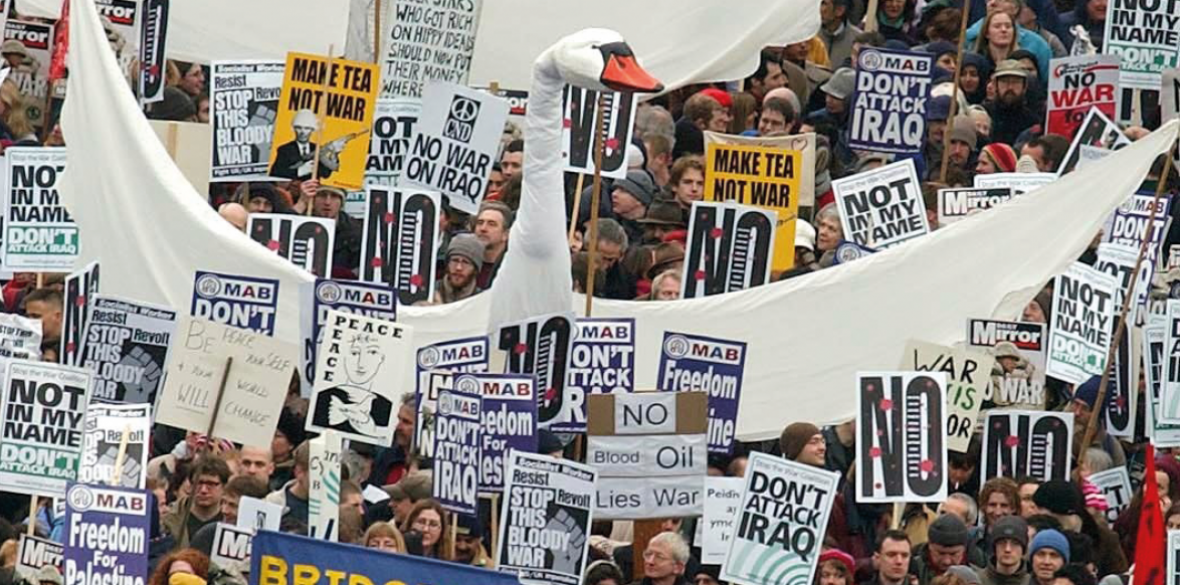This is the last article you can read this month
You can read more article this month
You can read more articles this month
Sorry your limit is up for this month
Reset on:
Please help support the Morning Star by subscribing here
IN two key respects, there is a broad consensus about the February 15 2003 anti-Iraq war march.
First, it’s understood to be the largest political demonstration in British history, with over one million people marching in London.
Second, it is generally considered a total failure, something many on the left also believe.
For example, in 2011 Ellie Mae O’Hagan, former director of the Centre for Labour and Social Studies think tank, asserted it was “monumental” but “did absolutely nothing.”
While the first point is correct, what about the latter? To get a handle on the importance and influence of that historic Saturday we need to head back over 20 years.
According to CBS News, within hours of the September 11 2001 terrorist attacks on the United States, US defence secretary Donald Rumsfeld was telling aides to come up with plans to strike Iraq. Following the US-British invasion of Afghanistan in October 2001, the drumbeats for war on Iraq grew louder, with US president George W Bush stating in his 2002 State of the Union address that Iraq, along with Iran and North Korea, was a member of the “axis of evil,” which “by seeking weapons of mass destruction… pose a grave and growing danger.”
In Britain the anti-war movement grew quickly, with the Stop the War Coalition, set up in September 2001, joining forces with the Muslim Association of Britain and CND. Around 400,000 attended a September 2002 demonstration.
With tensions building, Tony Blair’s Labour government made extraordinary efforts to persuade the public to support military action in what British historian Mark Curtis has called “a government propaganda campaign of perhaps unprecedented heights in the post-war world.”
Dodgy dossiers were published, and there were several well-publicised terrorism scares in late 2002 and early 2003, including stationing tanks at Heathrow to supposedly counter a plot to attack the airport.
Much of the media was supportive of the war, including the Observer. Speaking to me in 2009, Tony Benn explained “the Guardian was a bit wobbly” while “the Morning Star was the only paper that gave systematic day-to-day coverage” of the anti-war movement.
Under intense pressure, the BBC often echoed the government line and had little interest in anti-war activism.
“Since we, rightly or wrongly, see ourselves as public policy journalists then necessarily we look at what is happening in public policy — ie politicians and officials” rather than “those who were not in a position to make decisions, like the anti-war movement,” Kevin Marsh, the editor of the BBC Today programme in 2003, told me.
February 15 2003 itself was bitingly cold, with hundreds of coaches from across Britain transporting protesters to London.
Having already decided he would probably set his next book (2005’s Saturday) on the day, author Ian McEwan was out with his notebook recording his impressions.
“Every bit of civil society was there,” he told me. “It was unaccountably merry given the issue.”
With the march starting from two locations (Embankment and Gower Street) because the numbers were so big, “essentially the whole of London was moving from the east to the west,” Stop the War Coalition’s Chris Nineham commented.
The demonstration culminated in Hyde Park, with a long rally of speeches from public figures, including trade union leaders, Jeremy Corbyn, the Green Party’s Caroline Lucas, Salma Yaqoob, Liberal Democrat leader Charles Kennedy, Mo Mowlam, George Galloway, London Mayor Ken Livingstone and, finally, US civil rights leader Jesse Jackson.
The playwright Harold Pinter memorably proclaimed: “The United States is a monster out of control… the country is run by a bunch of criminal lunatics, with Tony Blair a hired Christian thug.”
Of course, it wasn’t just London. Opposition to the war was global, with the Guardian reporting up to 30 million people demonstrated against the war in more than 600 cities across the world.
One million people marched in both Barcelona and Madrid, over 500,000 in Berlin, likely over a million in Rome, 150,000 in Melbourne, and there was even a small protest in Antarctica.
The 400,000-strong protest in New York is commemorated in the Bright Eyes song Old Soul Song (for the New World Order).
Despite this enormous demonstration of public feeling, just over a month later the US and Britain invaded Iraq. With Bush and Blair failing to get UN security council backing, the UN secretary-general Kofi Annan noted “it was not in conformity with the UN charter” — ie it was illegal.
Elizabeth Wilmshurst, the deputy legal adviser at the Foreign Office, agreed, writing in her resignation letter that “an unlawful use of force on such a scale amounts to the crime of aggression.”
The initial assault and subsequent occupation caused the deaths of perhaps 500,000 Iraqis, displacing over 4.2 million people by 2007 according to the UN Refugee Agency.
Some 179 UK soldiers and over 4,400 US soldiers died, with many more wounded. In addition, the war significantly increased the terror threat in the West, with the 7/7 suicide bombers explicitly stating they were motivated by the Iraq war.
But while it didn’t stop the war, there is considerable evidence the march and the wider anti-war movement, by informing and mobilising British public opinion, has had many important short and long-term impacts.
First, it’s likely the growing anti-war sentiment inside and outside the Labour Party forced Blair to hold a parliamentary vote on the war, which hadn’t happened since the Korean war (this set a precedent for the Syria vote — see below).
And it’s likely the march itself increased the importance of Britain and the US getting UN security council approval, something British foreign secretary Jack Straw confirmed to US secretary of state Colin Powell in a February 16 2003 memo.
Furthermore, while it remains unknown to many, Peace News editor Milan Rai has highlighted how the anti-war movement actually came very close to stopping British involvement in the war.
According to the Sunday Telegraph, on “wobbly Tuesday” — March 11 2003 — the Ministry of Defence “was frantically preparing contingency plans to ‘disconnect’ British troops entirely from the military invasion… demoting their role to subsequent phases of the campaign and peacekeeping.”
Speaking to Rumsfeld the same day, defence secretary Geoff Hoon “stressed the political problems the government was having both with MPs and the public,” the Sunday Mirror reported.
The anti-war public mood was also likely a constraining influence on British forces in Iraq. In a 2016 RUSI Journal article, Major General Christopher Elliott noted there was “a cap on numbers, driven by political constraints rather than military necessity.”
The consequence of this was the British had “insufficient troops to be effective in the post-conflict phase in Iraq,” forcing “commanders in-theatre to react to events, and not to be able to shape them.”
As a politician, Blair was fatally wounded over Iraq, with a 2010 ComRes poll finding 37 per cent of respondents thought he should be put on trial for the invasion.
Peter Oborne has argued that without the public opposition to the war — and also what happened in Iraq itself — “there would not have been an [official] inquiry and the Chilcot report would never have been written.”
And in 2016 Blair’s spin doctor Alistair Campbell admitted the “widespread opposition to the war… played a big role in Corbyn’s rise.”
More broadly, the controversy over the decision to go to war also seems to have shifted British public opinion, with 52 per cent of respondents opposing British military interventions overseas in a 2019 YouGov survey.
A good example of this new reality came in August 2013 when MPs voted down Britain government’s motion to attack Syria — the first time a British prime minister had lost a vote on war since 1782. According to the Guardian, “the spectre of the 2003 Iraq war hung over the Commons” during the debate.
This defeat generated significant alarm within the Establishment. Speaking two years later, Sir Nick Houghton, Britain’s chief of defence staff, worried “we are experiencing ever greater constraints on our freedom to use force” due to a lack of “societal support, parliamentary consent and ever greater legal challenge.”
So beyond failing to stop the war, there have been some very important wins. And by remembering these victories, concerned citizens will hopefully remember the power they have to effect change.
As the New York Times noted at the time: “The huge anti-war demonstrations around the world this weekend are reminders that there may still be two superpowers on the planet: the United States and world public opinion.”
Ian Sinclair is the author of The March That Shook Blair: An Oral History of February 15 2003, published by Peace News Press. Follow Ian on Twitter @IanJSinclair.










